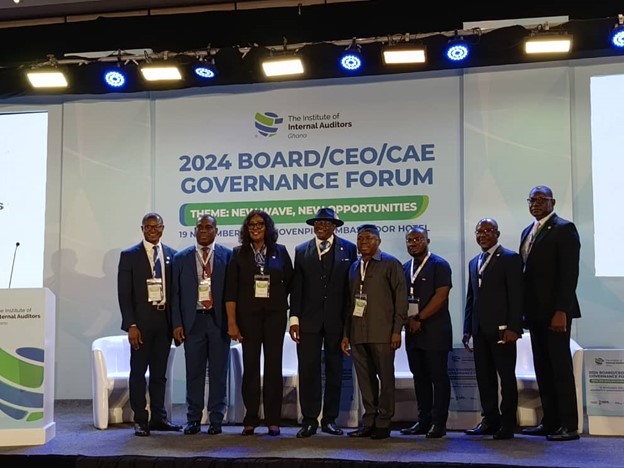By Juliet ETEFE ([email protected] )
Dr. Alhassan Andani, Executive Chairman of LVSA Africa, has urged internal auditors to adopt advanced technologies to enhance the scope, accuracy, and efficiency of their work.
Speaking at the 2024 Board, Chief Executive Officer, Chief Audit Executive and Governance Forum in Accra, Dr. Andani emphasised the critical role of technology in transforming internal auditing practices to meet the demands of a rapidly evolving global environment.
To this end, in his keynote address, he underscored the urgent need for internal auditors to integrate modern tools such as artificial intelligence (AI), analytics, and others into their operations.
He noted that these technologies have become essential for enhancing efficiency, detecting fraud, and improving governance. Hence, by adopting AI, auditors can analyse large volumes of data in real-time, enabling them to assess risks more proactively and make informed decisions.
“Adopting advanced tools is no longer optional; it is imperative,” Dr. Andani asserted, adding that “Ghana’s internal audit landscape must evolve to meet international standards and tackle the growing challenges of resource constraints, weak governance structures, and the complexities of modern financial systems.”
He further stressed the importance of understanding the applications and implications of the technologies in transforming audit functions, ensuring transparency, and mitigating risks in financial systems.
Challenges
He mentioned that many internal audit departments in Ghana continue to struggle with resource constraints, outdated tools, and weak governance structures.
These limitations not only hinder the effectiveness of audits but also compromise their ability to align with global standards.
Dr. Andani noted that overcoming these challenges requires not only technological investments but also strong leadership and collaboration among stakeholders.
Speaking on the need for continuous professional development to bridge the skill gaps in the auditing sector, he called for targeted training programmes and certifications to equip auditors with expertise in emerging fields such as data analytics, cybersecurity, and AI applications.
The forum, organised by the Institute of Internal Auditors (IIA) Ghana, was themed ‘New Wave, New Opportunities’ and attracted leaders from governance, auditing, and executive management.
It provided a platform to explore the challenges facing internal auditing and the opportunities available to reshape the field through innovation, collaboration, and strategic governance.
Strategic focus on governance
President of IIA Ghana, Joseph Dakora Zumasigee highlighted the forum’s theme as a reflection of the dynamic and volatile environment in which organisations operate.
He reflected on the dynamic and uncertain global environment shaped by technological advancements, sustainability concerns, and geopolitical tensions, noting that internal auditors must be proactive in helping organisations navigate risks and seize new opportunities.
“Changing times demand leaders who can rise to the occasion, adopt superior solutions, and create resilient organisations,” he stated.
Mr. Zumasigee urged leaders to embrace innovation, prioritise professional development, and collaborate to create resilient organisations.
He added that fostering collaboration between academia and industry is essential to building a robust pipeline of skilled auditors capable of addressing modern challenges.
One of the key areas of discussion during the forum was Environmental, Social, and Governance (ESG) auditing. As stakeholders globally demand greater accountability in sustainability practices, internal auditors were encouraged to assess organisations’ compliance with environmental regulations, social impact initiatives, and governance frameworks.










